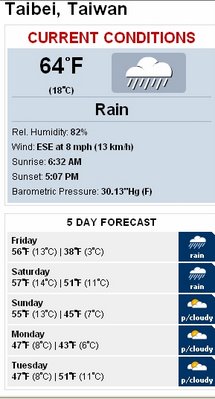TAIPEI, Taiwan (AP) -- Asia is bouncing back from a massive communications outage, with phone and Internet providers cobbling together new networks after an earthquake off southern Taiwan clipped connections.
By Thursday, less than 48 hours after the magnitude 6.7 quake damaged two crucial undersea cables, telecommunications companies from South Korea to Singapore had restored most services to millions.
They did it by borrowing surplus transmission capacity from other companies and using satellites, confounding predictions of weeks of communications chaos.
Meanwhile, the Taiwan company at the heart of the crisis, Chunghwa Telecom, said four repair ships were heading to the damage sit, and were expected to arrive Tuesday.
Chunghwa said repairs would take up to three weeks.
The company estimated its revenue loss from the earthquake damage at about NT$100 million ($3.06 million).
Chunghwa has said repairs will cost about $50 million (US$1.53 million).
Cables occasionally snap, but this time was different.
"Cables break all over the place, from sharks nibbling, anchors dragged across," said Markus Buchhorn, an information technology expert at Australia National University.
He said the breaks are serious when, as in this case, several snap at once and there are no immediate backup lines.
The Asian communications outage reminded stock traders and others of the Internet's importance.
"We've become too dependent on these optic fibers," said said Francis Lun, general manager at Fulbright Securities in Hong Kong. "A few of them get damaged, and everything collapses."
Hong Kong online gamer Daniel Lee, 28, said he could not spend his usual eight to 10 hours a day playing Internet games.
"It's a hassle and it's depressing, but I can't do anything about it," said Lee, who is unemployed.
Long lines formed at Hong Kong's airport, where computers were not working at check-in counters for Taiwan's China Airlines.
Employees at China's biggest phone company, China Telecom Corp., said Internet and phone connections were still slow.
South Korea's biggest carrier, KT, said more than half of its 92 damaged lines should be fixed soon.
In Japan, major carriers KDDI Corp. and NTT Communications said most fixed-line phone services were running.
Tim Dillon, senior research director at U.S.-based Current Analysis, which studies the telecom industry, said customers in Asia will have to get used to slow service for some weeks.
"We have a lot of traffic all going to alternate routings at the same time," Dillon said. "It's obviously going to result in slower speeds and congestion as everyone piles onto the same cable."
.
Copyright 2006 The Associated Press. All rights reserved.This material may not be published, broadcast, rewritten, or redistributed.
Happy 2012
13 years ago






